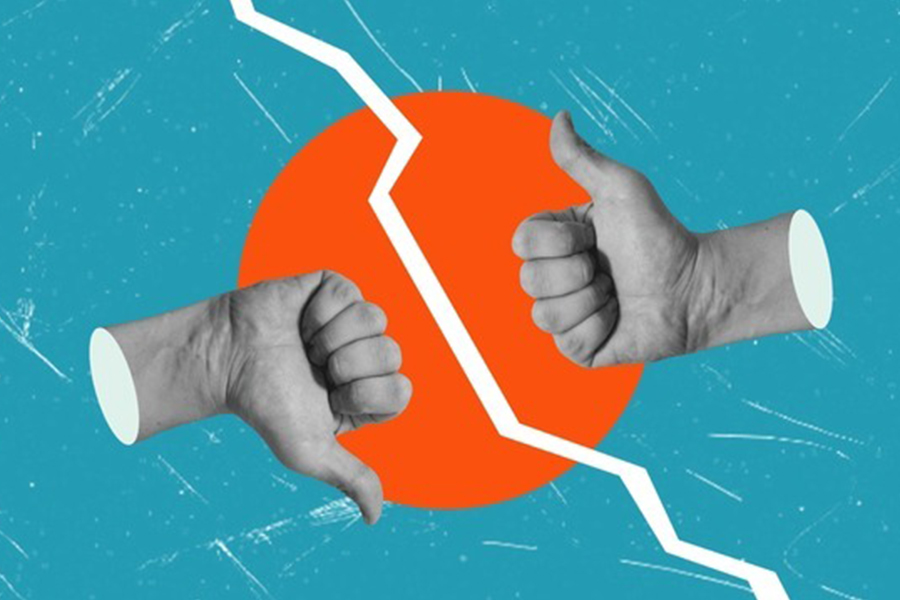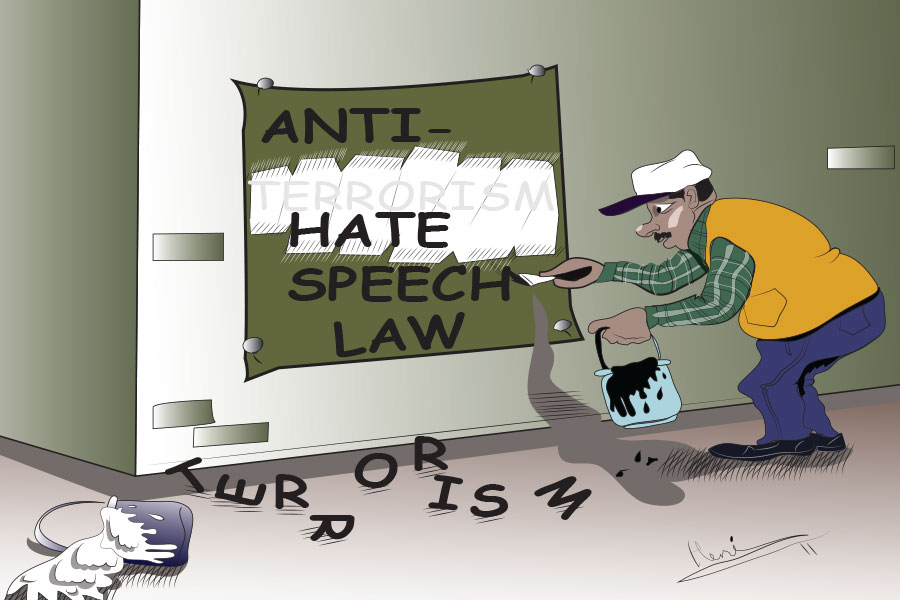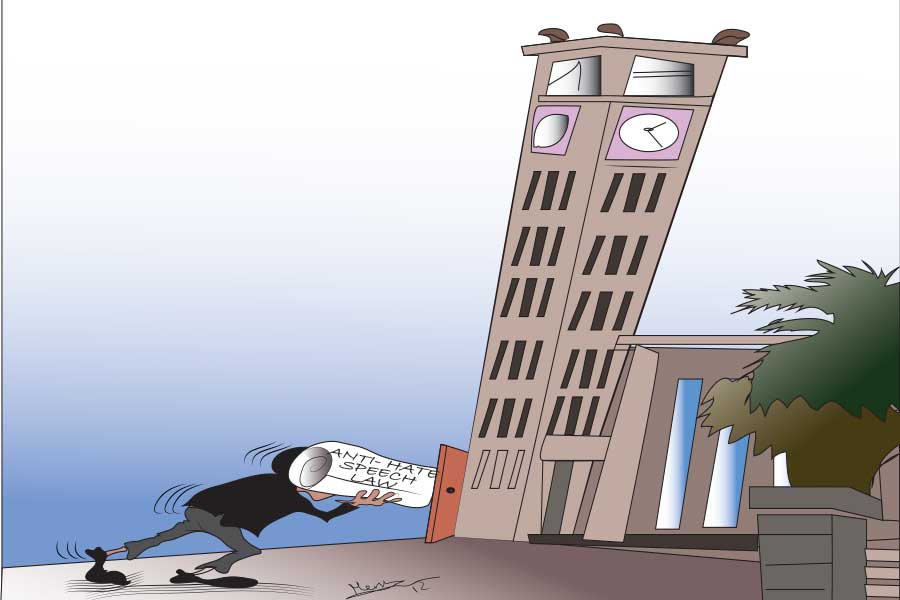
View From Arada | Jul 20,2024
Apr 13 , 2019
By Tsion Fisseha
Hate is a strong emotion, often manifested through actions or words. It is a popular opinion that hate, if not a completely factual one, is the most unnatural of emotions for living things. It is something we learn through time, perhaps beginning on the playground. It grows bigger, sometimes bigger than ourselves, and gets passed on to generations in its various incarnations like wildfire.
In the past year this particular emotion has been felt across the country. It has spread through many platforms and has continued to increase. It has taken the form of political, cultural and, most worryingly, religious dimensions.
The government is clearly worried about this phenomenon. But government being government, its answer to the problem is not taking the hardest but most practical path, which would be addressing underlying social, economic and political problems. Instead, it is working on a law that criminalises hate speech.
The bill is being drafted by the Attorney General and is currently undergoing public discussion. The articles stipulated in this bill are subject to change, sometimes even on a daily basis.
The draft legislation explained why the need arose to come up with laws to criminalize false information and hate speech. And while there is a general agreement that such views are not helpful, it has been hard for many to see how it can be addressed by a law that will, in the end, be interpreted subjectively. Neither in the bill or through international experience has there ever been a clear parameter on what constitutes hate speech - it has a broad and open interpretation.
Following the announcement of the bill, the public has seized on the idea of the legislation contradicting the freedom of expression. What was fascinating to notice was the degree of hate the hate speech legislation was met with on social media.
One can see where they are coming from. Most people are not extremists - at the most, they are misguided – and would prefer not to see the daily escalation in rhetoric in Ethiopia. But the problem is that there is doubt such a law can eradicate these problems. What most are afraid of is how such laws can easily be abused, as was the case with the anti-terrorism law currently under review.
Hate is rarely encouraged by society. It is something that, even as little children, one has been told to shy away from. Ideally, this world would be a wonderful place with the absence of hate.
But if there is a true willingness to curb this scourge, the most fruitful way to go about it is to start on a grassroots level. This is a problem that requires vaccinations not cures.
Hate speech is a symptom of the hatred and distrust citizens have come to feel about their fellow citizens because of political and economic inequality. No amount of rules and regulations can address this problem. In fact, by banning them, all we would succeed in doing is pushing important discussions that we may not like - but have to have - into the underground.
What we have to strive for is creating a democratic country where citizens are informed. We need movements that enlighten people about the dangers of hate speech, educating the community with the need to channel the hate toward something productive, and showing citizens that ideas should fight but not people.
This would be a hard battle to win given political opportunists, who thrive on hatred and division, who will put up a very strong fight. But with a determined government and civil society, this is indeed a battle that can be won and has been won before.
PUBLISHED ON
Apr 13,2019 [ VOL
20 , NO
989]


View From Arada | Jul 20,2024

Editorial | Apr 13,2019

Films Review | Jul 27,2019

My Opinion | Nov 14,2020

Films Review | Dec 05,2018

Commentaries | May 04,2019

Editorial | Nov 16,2019

Life Matters | Jul 13,2024

Photo Gallery | 172056 Views | May 06,2019

Photo Gallery | 162288 Views | Apr 26,2019

Photo Gallery | 152072 Views | Oct 06,2021

My Opinion | 136351 Views | Aug 14,2021





Dec 22 , 2024 . By TIZITA SHEWAFERAW
Charged with transforming colossal state-owned enterprises into modern and competitiv...

Aug 18 , 2024 . By AKSAH ITALO
Although predictable Yonas Zerihun's job in the ride-hailing service is not immune to...

Jul 28 , 2024 . By TIZITA SHEWAFERAW
Unhabitual, perhaps too many, Samuel Gebreyohannes, 38, used to occasionally enjoy a couple of beers at breakfast. However, he recently swit...

Jul 13 , 2024 . By AKSAH ITALO
Investors who rely on tractors, trucks, and field vehicles for commuting, transporting commodities, and f...

Oct 4 , 2025
Eyob Tekalegn (PhD) had been in the Governor's chair for only weeks when, on Septembe...

Sep 27 , 2025
Four years into an experiment with “shock therapy” in education, the national moo...

Sep 20 , 2025
Getachew Reda's return to the national stage was always going to stir attention. Once...

Sep 13 , 2025
At its launch in Nairobi two years ago, the Africa Climate Summit was billed as the f...

Oct 5 , 2025 . By NAHOM AYELE
In Meqelle, a name long associated with industrial grit and regional pride is undergo...

Oct 5 , 2025 . By BEZAWIT HULUAGER
The federal government is set to roll out a new "motor vehicle circulation tax" in th...

Oct 5 , 2025 . By NAHOM AYELE
The Bank of Abyssinia is wrestling with the loss of a prime plot of land once leased...

Oct 5 , 2025 . By BEZAWIT HULUAGER
The Customs Commission has introduced new tariffs on a wide range of imported goods i...